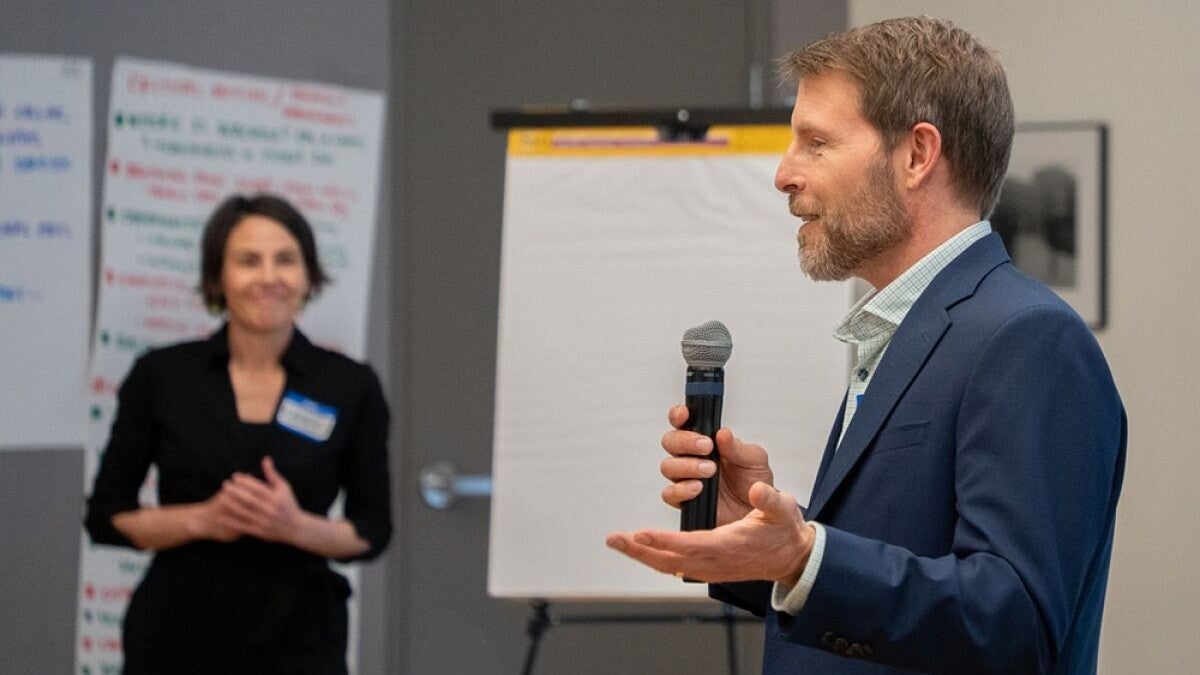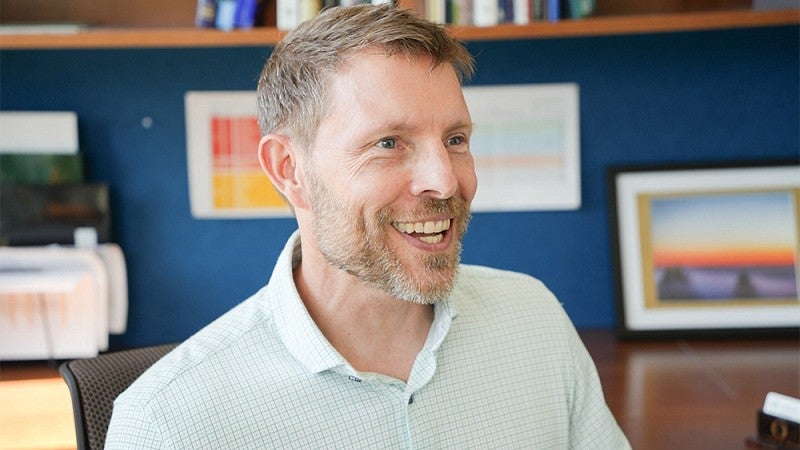
Experiential Learning | Research & Innovation | Community Impact | Career Preparation | Teaching Excellence | 21st Century Liberal Arts | Building Community | Good Vibes | CAS Spotlights | All Stories | Past Issues

September 27, 2024
Creating a Future Forward CAS
The world is changing at an unprecedented pace, and its transformation has touched every aspect of our lives—from social norms to where and how we carry out our work. Determining how to prepare students for success in an uncertain future can feel a bit like gazing into a crystal ball.
But Chris Poulsen, Tykeson Dean of the College of Arts and Sciences, is no stranger to big-picture thinking.
Poulsen, a paleoclimatologist, uses theoretical models of past climate change on Earth to help scientists forecast what’s in store for the planet’s future. He stepped into his role as CAS’s leader at a time when the University of Oregon, like most other higher education institutions, faces weighty challenges.
“Many Americans are questioning the value of higher education due to rising costs and delayed returns on investment,” he says. “Additionally, rapid technological advances and evolving workforce demands require changes in academic programming and teaching methods. And a demographic enrollment cliff is looming, with a projected decline in the number of high school graduates over the next decade.”
It’s a crucial time for higher education. As Poulsen puts it: “CAS is not immune to any of these challenges and must proactively respond to serve the needs of our students.”
Now entering his third year as dean, Poulsen is leading the development and execution of a new strategy that aims to establish the college as an innovator and leader in liberal arts education. Over the past year, he and his team collaborated with members of the CAS community to identify seven strategic priorities, and they are now working on creating an implementation plan and timeline, which he will share on the CAS website during fall term.
CAS Connection recently spoke with Poulsen to get his take on the state of CAS and the hows and whys of its new direction.

What strengths can CAS leverage to meet the present moment?
CAS is a special place. It offers an outstanding undergraduate education within a research-intensive environment, while maintaining an intimate setting that facilitates collaboration and student-faculty engagement. Striking that balance—between the resources and opportunities of a major research institution and a student-focused, personalized education—is one of our greatest strengths.
The qualities and skills that a CAS liberal arts education fosters are exactly what the present moment demands. Employers are seeking graduates who are not only knowledgeable but also adaptable, collaborative and equipped to tackle complex problems. Our programs cultivate these traits and other fundamental skills that are crucial to navigating a rapidly changing world: effective communication, critical and creative thinking, and technological literacy.
How will the strategic plan help CAS address the challenges in higher ed?
A key focus of the plan is to more explicitly articulate how a CAS education prepares students for their future and to grow opportunities for practical experiences. To that end, we are expanding academic advising and career readiness initiatives, increasing opportunities for experiential learning, and evolving our programs and curriculum to align with emerging trends and technologies.
Through these strategies, we aim to better prepare our students for success in an ever-changing landscape, while reinforcing the value and relevance of a liberal arts education.
What is your vision for CAS over the next five years?
My vision for CAS is to build on its existing strengths to establish it as a national leader in liberal arts education, innovation and impact, and inclusivity. CAS is deeply committed to fostering academic excellence, supporting groundbreaking scholarship and nurturing an inclusive community. My goal is to amplify these strengths, enhancing our reputation and expanding our impact in these critical areas.
As a result, a CAS education will prepare our students to meet the challenges of a twenty-first century world, equipping them with skills and broad knowledge that will set them up for a lifetime of contributions. CAS will be known nationally for research and scholarship that addresses the complex challenges of our time and drives positive societal change.
Above all, CAS will be a vibrant and supportive academic community where students, faculty and staff thrive and feel valued.
What excites you most about the strategy, and why?
There are two aspects of the plan that really excite me.
First, it was a collaborative effort that reflects the voices of our entire community of faculty, staff, students and alumni. It was important to me that the plan include as many perspectives as possible in shaping our shared future.
Second, the plan is forward-looking and ambitious. There are no small ideas.
What changes can the average CAS student, faculty member or employee expect from this strategy?
We’ve already begun addressing some of the priorities highlighted in the plan, especially around our goals to provide holistic advising and career preparation.
In the last year, we reorganized CAS Advising to make it more visible and accessible to students. We also conducted an analysis of the college’s career readiness landscape.
Based on the recommendations from that study, we are searching for an Assistant Dean for Career Readiness, who will oversee our efforts to integrate career preparation throughout our students’ college journey. We also are adding Experiential Learning Managers to help connect students to internships, research projects and other hands-on experiences that are so critical to positioning them for rewarding careers.
Additionally, we’ve been expanding our academic programming and hiring in areas that grow our ability to incorporate technology into our curriculum while providing opportunities for students in high-demand fields. These include data and computer sciences, cybersecurity, and material sciences, to name a few.
What does joining the Big 10 mean for CAS?
We’re thrilled to have joined the Big 10. Most people think of it only as an athletic conference, but it’s so much more!
As a member of the Big 10, we now belong to the Big 10 Academic Alliance (or BTAA as we call it), an academic partnership between all 18 universities within the conference. Its purpose is to advance our shared academic missions by exchanging expertise and creating peer networks, leveraging resources, and collaborating on projects. The BTAA is truly a peerless model for institutional cooperation and partnership.
Between our partnership with these academic powerhouses and the tireless passion of our faculty and staff, CAS couldn’t be better positioned to meet the coming challenges in higher ed—and to catapult our students to success in a rapidly changing landscape. I look forward to seeing what the next five years will bring!
—By Nicole Krueger, College of Arts and Sciences
